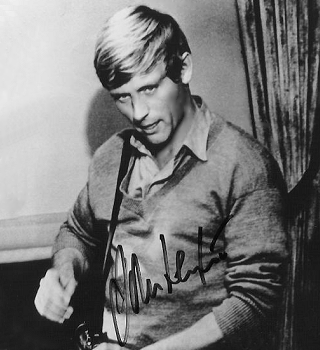Sixties
City presents
a wide-ranging series of
articles on all aspects of the Sixties, penned by the creator of the iconic
60s music paper Mersey
Beat
|
Sixties
City presents
a wide-ranging series of
articles on all aspects of the Sixties, penned by the creator of the iconic
60s music paper Mersey
Beat
|
|||||
|
| John
Leyton, born in Frinton-on-Sea, Essex, was one of the first British artists
to become an international success in the 60s. He came from a show business
family, his father owning theatres and cinemas and his mother an actress
on the London stage under the name Babs Walton. He was only six years old
when his parents divorced and he was sent to various boarding schools. He
later settled in London with his father and step mother and attended stage
school where he was spotted and offered a recording test at EMI. This proved
something of a disaster, even though he was accompanied on piano by Russ
Conway. He chose the song ‘A Man On Fire’ and recalled “the whole experience
was dreadful. I was extremely nervous, I chose the wrong song, I sang it
badly and I couldn’t wait to get out of there”. In 1961 when his single ‘Johnny Remember Me’ topped the British charts, he was voted ‘Newcomer Of The Year’, while the number was awarded ‘Best Song Of The Year’ and sold over a million copies worldwide. His follow-up ‘Wild Wind’ reached the Top Ten in several countries including Japan, Scandinavia, Israel, Australia and New Zealand. World tours and a further string of hits, nine chart records in all, followed. However, John decided to return to his first love – acting. He’d originally been spotted by Granada Television while appearing at the Theatre Royal, York and was offered the leading role in their year-long TV series ‘Biggles.’ He next became a guest star in the series ‘Harpers, WI’, in which he portrayed a pop singer – and it was this series which resulted in his No.1 hit ‘Johnny Remember Me'. The handsome, blond-haired actor/singer had become an international star attraction and was soon inundated with film offers. He made his movie debut in ‘The Great Escape' in 1963, appearing with Steve McQueen, James Garner and Charles Bronson. Throughout the decade he appeared in several other major productions, including ‘Guns At Batasi’, providing the love interest for Mia Farrow, ‘Von Ryan’s Express’, with Frank Sinatra and ‘Krakatoa, East Of Java'. By this time John had moved to Hollywood and was also in demand for TV work, appearing in numerous series such as ‘The Man From Uncle’, ‘Lost In Space’, ‘Mission Impossible’ and ‘Longstreet’, in addition to starring in the series ‘Jericho.’ His return to Britain was prompted by the offer of involvement in film production in an executive capacity and he worked on several productions, mainly of a musical nature, including ‘Sheena Easton Live At The Palace, Hollywood,’ ‘With A Little Help From My Friends’, ‘Song By Song’ and ‘The Music Of Gerald Kenny.’ John next became a successful businessman and, apart from his work as an actor, writer and producer, became a restaurateur. He was Chairman and Managing Director of the well known London restaurant The Meridian before selling it for redevelopment. In 1993 he made a decision to return to show-business and take up a string of demands for personal appearances on both TV and radio. He also became guest artist on a number of ‘Solid Gold Rock & Roll’ tours. In 2006 he released ‘Hi Ho Come To Engand’, an interpretation of the Jeff Beck number ‘Hi Ho Silver Lining’ and appeared in the film ‘Telstar’, a biopic of Joe Meek the following year.
|
 |
|
Article
Text
UK
web hosting by
|